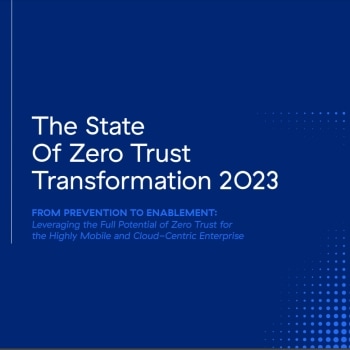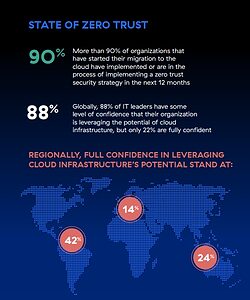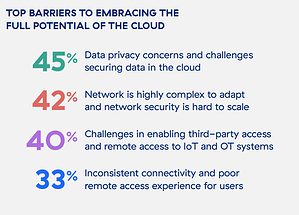
As the study "Zero Trust-Transformation 2023" shows, 90 percent of global companies are already implementing or planning some form of zero trust in their cloud infrastructure, but they are not yet exploiting the full transformation potential.
Zscaler releases its 2023 Zero Trust Transformation Global Study. As part of the survey, more than 90 percent of IT leaders who have already migrated to the cloud or are in the process of migrating said they have a Zero Trust security architecture in place, currently implementing or planning to implement.
Cloud infrastructure plus Zero Trust

🔎 Zero trust for cloud infrastructure: 90 percent have it, plan to implement it. Regionally, however, trust is still low (Image: Zscaler).
Supporting such a large-scale migration is that more than two-thirds (68%) of decision makers believe a secure cloud transformation is not possible with existing network security, or that Zero Trust Network Access (ZTNA) offers advantages over traditional firewalls and VPNs for remote access to applications. That's according to the State of Zero Trust Transformation 2023 report, based on a global survey of 1.900 senior IT leaders in organizations already migrating applications and services to the cloud.
Against the backdrop of rapid digital transformation, Zscaler research shows that Zero Trust, with the principle that no user or application is inherently trusted, provides an ideal framework for securing users, workloads and IoT/OT environments in a highly distributed and mobile world. From a holistic IT perspective, Zero Trust has the potential to unlock opportunities throughout the digitization process, from innovation to workforce empowerment to greater cost efficiencies.
The most important hurdles in dealing with the cloud
IT leaders cited IT security, access and complexity as the top concerns about the cloud. This is a clear vote for Zero Trust to overcome these hurdles. When asked about existing network and security infrastructures, 54 percent of those surveyed stated that VPNs or perimeter-based firewalls do not offer effective protection against cyber attacks or only allow insufficient transparency into application data traffic or attacks. This underscores the opinion of respondents that 68 percent believe a secure cloud transformation is impossible with existing network security or that Zero Trust Network Access offers advantages over traditional firewalls and VPNs when it comes to securing remote access to applications.
A lack of confidence
Zscaler also found that only 22 percent of organizations globally are fully committed to realizing the full potential of their cloud infrastructure. So, while companies have taken their first steps on their journey to the cloud, there is still a lot of potential to fully enable the benefits of the cloud. At a regional level, 14 percent of companies in EMEA are confident in using their cloud infrastructure compared to 42 percent in the Americas or 24 percent in Asia. Sweden (21%) and the UK (19%) are still the most confident in using their cloud infrastructure, with the rest of Europe lagging behind: the Netherlands at 14%, Italy (12%), France and Spain each 11 and Germany with 9 percent.

🔎 Zero trust for cloud infrastructure: The biggest obstacles to realizing its full potential (Image: Zscaler).
While at first glance security may seem to stand in the way of realizing the full potential of the cloud, the reasons for cloud migration point to a more fundamental hurdle in perspective. IT leaders cited privacy concerns, security challenges for data in the cloud, and challenges in scaling network security as the top barriers to realizing the full potential of the cloud. However, when asked about the most important factors for digital transformation initiatives, cost reduction, support for new technologies such as 5G and edge computing, and overcoming cyber risks were mentioned. These responses suggest that there is still a lack of understanding of how the cloud can help execute business strategies.
Promote the hybrid mix with Zero Trust
IT decision makers surveyed as part of the Zscaler study indicated that employees at their companies will have a variety of work location options available over the next 12 months. A distinction was made between full-time office work (38%), fully flexible work location (35%) and hybrid job choice (27%). However, the study also showed that companies are not yet optimally prepared for the constantly evolving mix of hybrid forms of work.
Globally, only 19 percent of those surveyed said that a zero trust-based infrastructure specific to hybrid work styles is already in place. This suggests that organizations are not fully prepared to ensure the security of a highly distributed work environment. In addition to those decision-makers who have already updated their infrastructure, another 50 percent are already implementing or planning a Zero Trust-based hybrid strategy.
Zero Trust based hybrid strategy
The user experience of the employees was cited as the most important reason for the introduction of a Zero Trust-based hybrid work infrastructure. More than half (52%) agreed the implementation would help eliminate inconsistent access experiences for on-premises and cloud-based applications and data.
46 percent said Zero Trust would combat lost productivity due to network access issues, and 39 percent believe Zero Trust would make it easier for employees to access apps and data from personal devices. These assessments reflect the challenge beyond security that hybrid working brings in terms of access, user experience and performance, and underscores the role of zero trust.
The potential of Zero Trust as a business enabler
Consistent with the motivation for cloud migration, Zscaler found that when companies plan for new technology initiatives, they lack alignment with broader strategic business goals. When asked about the biggest challenge when implementing new technology projects, 30 percent of those surveyed named adequate security, followed by the budget requirements for further digitization (23 percent). Only 19 percent cited dependence on strategic business decisions as a challenge. The focus on security while neglecting business alignment suggests that organizations have not yet recognized zero trust as the basis for their strategic goals.
Background of the study
The results of this data are based on an ATOMIK Research study commissioned by Zscaler, which surveyed 1.908 senior decision makers (CIOs / CISOs / CDOs / Head of Network Architecture) in EMEA (UK, Germany, France, Netherlands, Sweden, Italy, Spain) , AMS (US, Mexico, Brazil) and APAC (Japan, India, Australia, Singapore) surveyed. The investigation was conducted in July 2022. The sample comprised 43 percent of companies with up to 4.999 employees, 32 percent with up to 9.999 employees and 25 percent with 10.000 or more employees.
More at Zscaler.com
About Zscaler Zscaler accelerates digital transformation so customers can become more agile, efficient, resilient, and secure. Zscaler Zero Trust Exchange protects thousands of customers from cyberattacks and data loss by securely connecting people, devices, and applications anywhere. The SSE-based Zero Trust Exchange is the world's largest inline cloud security platform, distributed across 150+ data centers around the world.
